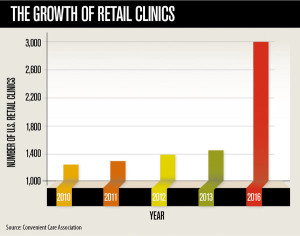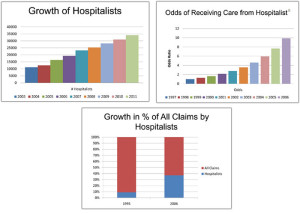
Todays issue of the Boston Globe had a great article in the Business Section on the Rise of Retail Clinics and how they are rising to meet the needs of patients. The article is below for those who wish to read it and please read the comments, as they are always fantastic when it comes to articles on our healthcare system.
The main question I ask in this blog entry is: Why are these clinics popping up everywhere and having success? It is actually a very simple answer- they are filling the void that our fractured, third-party based healthcare system has left in its path of destruction of the physician-patient relationship. They are the callus on the fracture, but they are not the cast that will keep it fixed for good!
Patients used to have access to their OWN doctor or nurse when and if they needed them, even if it were for a simple question. Now, because of a warped third party payment system and corporate run healthcare, patients feel as if they are nothing more than a number on a list. They would rather go see a doctor or NP that knows nothing about them at a pharmacy than their “in-network listed ‘PCP’ “. Why? Because they do not want to listen to a 5 minute list of menu options on a phone; they do not want to be on hold for ten; they do not want to wait to have their problem addressed for hours to days, especially when ill; they do not want to pay a copay or deductible for a rash that could be diagnosed with a picture; and most importantly they do not want to be rushed in and out in 10 minutes after waiting for 45! So do I begrudge companies like CVS for opening these clinics and do I begrudge patients for going to them? Absolutely not!
So whom do I have issue with? I have issue with a system that has been perpetuated for long enough to allow this fracture and pseudo-callus to form. The reason I call it a “pseudo-callus”- and this is in no way to be disparaging to the doctors and NPs who work at these clinics- is because they are not the patients OWN doctor. Are the “providers” at these clinics going to be there when that simple cough turns into a lung mass or emphysema? Are they going to be there when that simple UTI is actually a bladder cancer? No matter how excellent the quick care is, I ultimately believe that people still crave their OWN doctor. DPC not only fills this void, it is the cast that will allow this broken system to heal once and for all. And not only do you not have to “check with your insurer about coverage”, my monthly fee is cheaper than the visits to these clinics. See here: CVS Minute Clinic Prices
It is time doctors and patients look for the cast rather than the band-aid.
Boston Globe Article: Minute Clinics Rising





